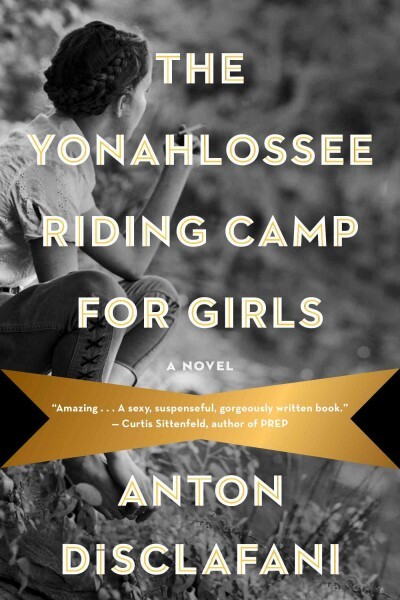New York Times Book Reviews the Yonahlossee Riding Camp for Girls

The Yonahlossee Riding Camp For Girls
Anton DiSclafani's debut novel, The Yonahlossee Riding Military camp for Girls, is a painstakingly constructed ode to a immature girl's sexual awakening — just courtly enough to be more bodice unbuttoner than bodice ripper. Like Rumer Godden'due south archetype 1958 novel, The Greengage Summertime, this is perhaps ane of the classier books a young teen would hibernate under her covers to read with a flashlight. It features a 15-year-old narrator, Theodora "Thea" Atwell, whose family unit banishes her to a North Carolina equestrian boarding schoolhouse in 1930. In that location's been a scandal. The Great Low is endmost in.
Thea describes herself as "a wrong girl if there always was one." From another girl, this might come across every bit a plea for sympathy, just this watchful, bold teenager, who begins her stay at Yonahlossee past poking through her new roommates' closets, never seems to seek compassion. She begins the novel convinced that whatever she did — and it doesn't take long to effigy out information technology has to do with sex — was a violation of social club's rules. "My character was not what it should accept been. Nobody had told me that, just I knew." She is both innocent and fallen.
DiSclafani cuts back and along between two richly imagined time frames and settings. In the past, there is Thea'south paradisiacal Florida dwelling house with its citrus groves and endless summer. There she rode her pony, Sasi, and hunted for snakes with her slightly older cousin Georgie and her twin brother, Sam, a artless boy with a gift for calming animals. In the present at Yonahlossee, where the sweet iced tea is addictively "thick and syrupy," and the iii stone barns and five riding rings announced as palaces to a horse-obsessed girl, she charily adjusts to the camp's complex social bureaucracy.
Although all the girls wear the same white uniforms of skirts and blouses with virginal Peter Pan collars, scholarship students mix with the upper-center-class campers, like Thea, and the very wealthy, who, despite the Depression, make it with red earrings or their own champion horses in tow. Teasing out the details of Thea's tragic surreptitious in flashbacks, DiSclafani introduces a new dearest interest near equally inappropriate as the boy at the eye of the original scandal. Her language is formal, almost deliberately stilted — except when it comes to the sexual practice — and her stately pacing as controlled as a horse beingness led through a dressage competition.
As guilty as Thea feels for her transgressions, she's aroused with her parents for sending her away, and while she reads their letters for news of Sam, she refuses to answer them. Instead she loses herself in novels (lots of Edith Wharton and E.M. Forster, natural choices for a daughter looking for tantalizing undercurrents of sexuality) — and horses, naturally. Like legions of teenage girls before her, the resentful Thea frequently feels powerless, only never on a equus caballus. Not when she's riding Sasi (" 'Yes, aye, yep,' I murmured, in rhythm to his amble.") or the mare she's assigned to at Yonahlossee: "I had all her power harnessed between my legs and hands, beneath me," Thea says. "I'd never felt such energy, roiling beneath me like a fierce wave."

Anton DiSclafani teaches artistic writing at Washington University in St. Louis. The Yonahlossee Riding Camp for Girls is her first novel. Nina Subin/Courtesy of Riverhead Books hide caption
toggle explanation
Nina Subin/Courtesy of Riverhead Books

Anton DiSclafani teaches creative writing at Washington University in St. Louis. The Yonahlossee Riding Military camp for Girls is her first novel.
Nina Subin/Courtesy of Riverhead Books
Shaking my head over these images, which fairly pant off the folio, I thought, what is it with girls and horses? (I don't recommending Googling this phrase at work.) But equally someone who spent many a tween hour poring over the novels of Mary O'Hara (My Friend Flicka), Marguerite Henry (Misty of Chincoteague) and Walter Farley (The Blackness Stallion), I shouldn't have to ask. And even though there were times when I found The Yonahlossee Riding Camp for Girls ponderous, if I were Thea'southward age, I would retreat to my bedroom and devour this sexy coming-of-historic period story similar a horse with a box of sugar cubes.
It isn't marketed as a young-adult novel, and the vintage photo on the jacket, of a young adult female holding a cigarette, might scare off some parents, but The Yonahlossee Riding Camp for Girls has all the hallmarks of a story meant to empower immature women; this is where its greatest value may prevarication. I loved the way DiSclafani, through Thea, captures the sudden, shocking loneliness of sex at a young age: "Maybe, I thought, every bit he pushed himself into me, it was plenty, that [he] would attempt to understand me after, that right now in that location was a need and when we were done the demand would not exist anymore."
While Thea's motivations would doubtless be described past someone of her era equally "urges," they are more circuitous than that. When she was 15, Thea'southward mother said to Sam, right in front of her: "Thea'south a girl. ...She doesn't affair like you do." I, for one, tin't blame this budding feminist for refuting that statement with everything she's got, even if it means she finds her power — and her glory — in reducing the nigh patriarchal figure at Yonahlossee to a man lying in the Due north Carolina dirt, begging her not to cease.
Mary Pols reviews movies for Time Magazine and Time.com and blogs on the MSN Page-Turner books blog. She is the author of the memoir Accidentally on Purpose: The True Tale of a Happy Single Mother.
hardwickewarrot1965.blogspot.com
Source: https://www.npr.org/2013/06/05/187044840/for-a-girl-and-her-horses-a-bumpy-ride-to-adulthood